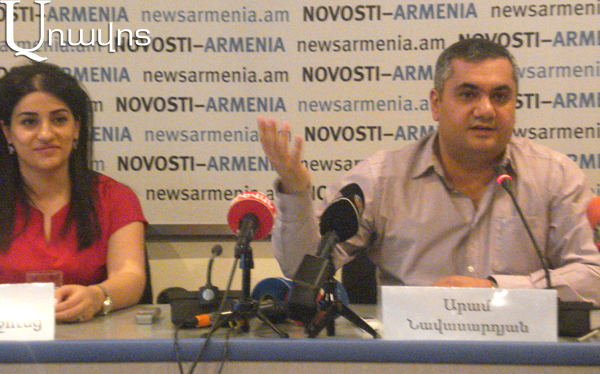“In 2013, prior to Serzh Sargsyan’s statement that we want to join the Customs Union, 67 percent of respondents was in favor of this Union, a month after the statement, this indicator became 64 percent, a year later, 57 percent of the society is in favor of the accession,” said Director of Gallup International Armenian Office, Aram Navasardyan, today, at the “Novosty” international press center. He presented the findings of the new polls on the themes “September 3: one year later” and “Situation in Ukraine: perception in Armenia” held on August 8-17 by Gallup International in Armenia. Mr. Navasardyan said that the decrease in number of those expressing “yes” to the Customs Union is due to uncertainty and mentions, “We are signing and not signing, it is due to the situation, the events in Ukraine also influence on the public opinion as the public is receiving various messages.”
To the question of whether the prerequisite with regard to Karabakh’s status has a role on this matter, Mr. Navasardyan replied, “If we emphasize the Karabakh issue during the poll, then the 57 percent of those expressing in favor of goes down to 23 percent.” Aravot.am asked whether the accession to this Union in the event of reduced public interest in the Customs Union is at risk, Mr. Navasardyan responded, “Going to all places is at risk, as well as staying in the place. I’m inclined to say on how to go to the Customs Union or the European Union. But we also need to calculate all the risks, because we have also a security problem.”
As presented by Aram Navasardyan, the picture received in the result of polls is as follows, “50 percent of the public is satisfied with their lives, 49 percent – not satisfied. One percent scored the household economic situation as “very good”, 14 percent – “good,” 52 percent – “average” 22 percent – “bad” and 11 percent – “very bad”. The country’s economic situation: 39 percent – “very bad”, 35 percent – “bad”, 21 percent – “average”, 3 percent – “good” and 0.3 percent – “very good”. As you can see, the percentage of positive responses in the household is greater than the economic situation in Armenia. This has become a common phenomenon, because we are conducting measurements once on six month since 2006, and the picture is always the same. Since the majority of household receives transfers from abroad, their economic condition is scored better that the country’s economic situation. To the question of what the household status would be one year later, 13 percent of respondents found it difficult to answer, 16 percent – “significantly bad”, 17 percent – “to some extent bad”, in other words, about 37 percent has bad expectations, and 33 percent believes that nothing will be changed in the country.”
Tatev HARUTYUNYAN




















































